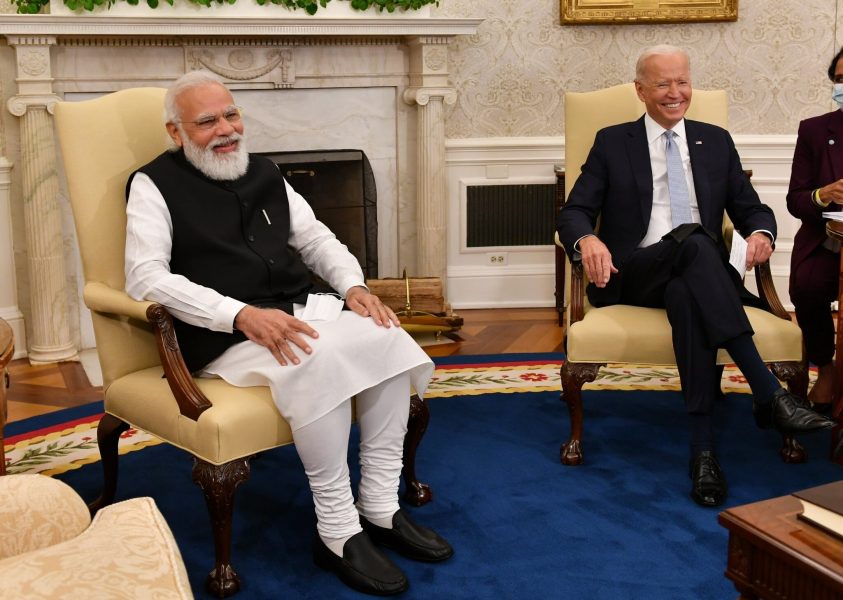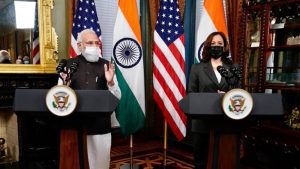
New chapter in Indo-US bilateral relations needs more depth
The Indian Prime Minister Narendra Modi could not have asked for more in his visit to Washington DC. The atmospherics was for all to see, it may not have been at that raucous pitch of the ‘Howdy Modi’ Event of 2019 in Houston given the current pandemic situation and the protocols in place.

The Indian Prime Minister Narendra Modi could not have asked for more in his visit to Washington DC. The atmospherics was for all to see, it may not have been at that raucous pitch of the ‘Howdy Modi’ Event of 2019 in Houston given the current pandemic situation and the protocols in place.
Modi met the Vice-President, Kamala Harris who is of Indian descent, he had a one-on-one meeting with President Joseph Biden and participated in the formal physical meeting of the Quad that included the presence of the Japanese and Australian Prime Ministers. What was striking in the meeting with Biden was the friendly banter, a much-needed sideshow for the two leaders who are facing different challenges in their respective countries.
What many do not understand is that when two leaders meet anywhere what they talk and the body languages will be known only to the people present in the room and to the extent the spokespersons are briefed and allowed to convey. At times, leaders even take a stroll with no aides present.
In the current context President Biden and Prime Minister Modi walked through apparently a number of issues including challenges in the neighborhood, terrorism, the pandemic, climate change, to mention just a few. The success of summits is largely determined by delegation-level talks both formal and in the many informal get-togethers leading up to the big event.
 Irrespective of the political punditry and what people who have no clue to what summits are all about, India and the United States are said to be opening up a New Chapter in their bilateral relationship, and it has to do with a number of challenges facing the two countries in South Asia, the Indo-Pacific and the global community at large.
Irrespective of the political punditry and what people who have no clue to what summits are all about, India and the United States are said to be opening up a New Chapter in their bilateral relationship, and it has to do with a number of challenges facing the two countries in South Asia, the Indo-Pacific and the global community at large.
Also read: Trump and his cronies are back, only this time Democrats are loving it
This is why both New Delhi and Washington see an increasing relevance of the Quad and a closer working together of the two Capitals to meet the daunting problems of South Asia. Both countries see the bottom line in both South Asia and the Indo-Pacific—the belligerence of China which increasingly seems to be spoiling for a showdown by its aggression in the Asia Pacific, the latest addition being the brazen violation of Taiwan’s airspace.
And added to all this, Beijing is trying to fish in the troubled waters of Afghanistan offering solace, comfort and a limited amount of economic assistance in return for a wishful thinking that its problems with the Uighur Muslim community have been taken care of. China seems to be perhaps the only country pushing for Kabul to be recognised in the comity of nations and pressurising the United States to unfreeze the assets of Afghanistan amounting to some US$ 10 billion that has been put in cold storage.
It is not as if Washington is seeing Beijing suddenly flexing its muscles beyond the South China Seas into the Taiwan Straits, the Sea of Japan and the waters of the Asia Pacific. It is also the fact that other members of the Quad like Australia, who have been voicing urgent concerns at the increased strategic maneuvers of Beijing that has eventually forced Canberra to opt for another security mechanism involving Britain and the United States for supply of nuclear-powered submarines, creating an uproar with another traditional western ally, France.
Some of the blistering comments from Paris had to do with the loss of a commercial deal signed with Australia in 2016 to supply some 12 diesel-powered submarines for an estimated cost of US$ 70 billion; a lot of it had also to with the manner in which Washington went about the whole thing—keeping France in the dark of what was transpiring.
If anything the Biden administration should have been upfront with Paris on the developments; and Australia should have impressed on the fact that the time-frame of delivery of 2035 was far too long given the dangers that being faced in the short and medium term. If the troika of AUKUS within the Quad is anything to go by, it is a lesson more on the management of traditional alliances than any urgent strategic compulsions.
Of course, commerce and money always matter; and not many are willing to buy the argument now of a “sudden” finding that nuclear-powered submarines are “better” than the conventional ones.
Also read: Afghan success propels mediator Qatar as ‘Norway of the East’
India too has a problem in the Indo-Pacific in terms of freedom of navigation with China arbitrarily claiming jurisdictions in the South China Seas violating every norm of international maritime laws. But it is a different cup of tea for Washington and New Delhi when it comes to South Asia and the new-found environment thanks to the Taliban in Afghanistan.
It is a well-known fact that both the Taliban and the Haqqanis are controlled by Islamabad’s army and the Inter-Services Intelligence; and the priority of the Imran Khan government is to use the present situation in Kabul to push as many terrorist thugs into India, notably of the Jaish e Muhamad and Lakshar e Toiba variety.
The United States — not just the Biden administration — has been in long denial of Pakistan’s complicity in terrorism. The official involvement in cross-border terrorism apart, Islamabad has developed the expertise of fooling successive administrations in Washington of it being a “partner” in the War on Terror since 2001; as well as cooking the books on reimbursements resulting in the loss of billions of dollars to the American taxpayer.
Washington has reluctantly gone along with this ostensibly because of logistics. Hopefully now with the Biden administration putting an end to the “Forever Wars”, it will hopefully also bring closure to the “Forever Handouts”, an issue that New Delhi should seriously raise with Washington every time the opportunity arises. It is a well-known fact that Pakistan uses some of these handouts to finance and support terrorism against India.
In summits and bilaterals it is comforting to refer to clichéd terms—oldest democracy, largest democracy, natural allies and what not. The width of India-United States relationship is quite expansive indeed cutting across politics, economic, cultural, social, educational and strategic. But along with the width, it would also be prudent to measure the depth of the relationship to see if it could weather any sort of turbulence, bilaterally and in the global arena.
President Biden recently said at the United Nations that his administration is focused on “relentless” diplomacy; and part of this should involve in an exercise of letting recalcitrant nations know the limits of patience.
A former senior journalist in Washington covering North America and United Nations, the writer is currently a Professor of Journalism and Mass Communication in the College of Science and Humanities at SRM Institute of Science and Technology, Chennai
(The Federal seeks to present views and opinions from all sides of the spectrum. The information, ideas or opinions in the articles are of the author and do not necessarily reflect the views of The Federal)


